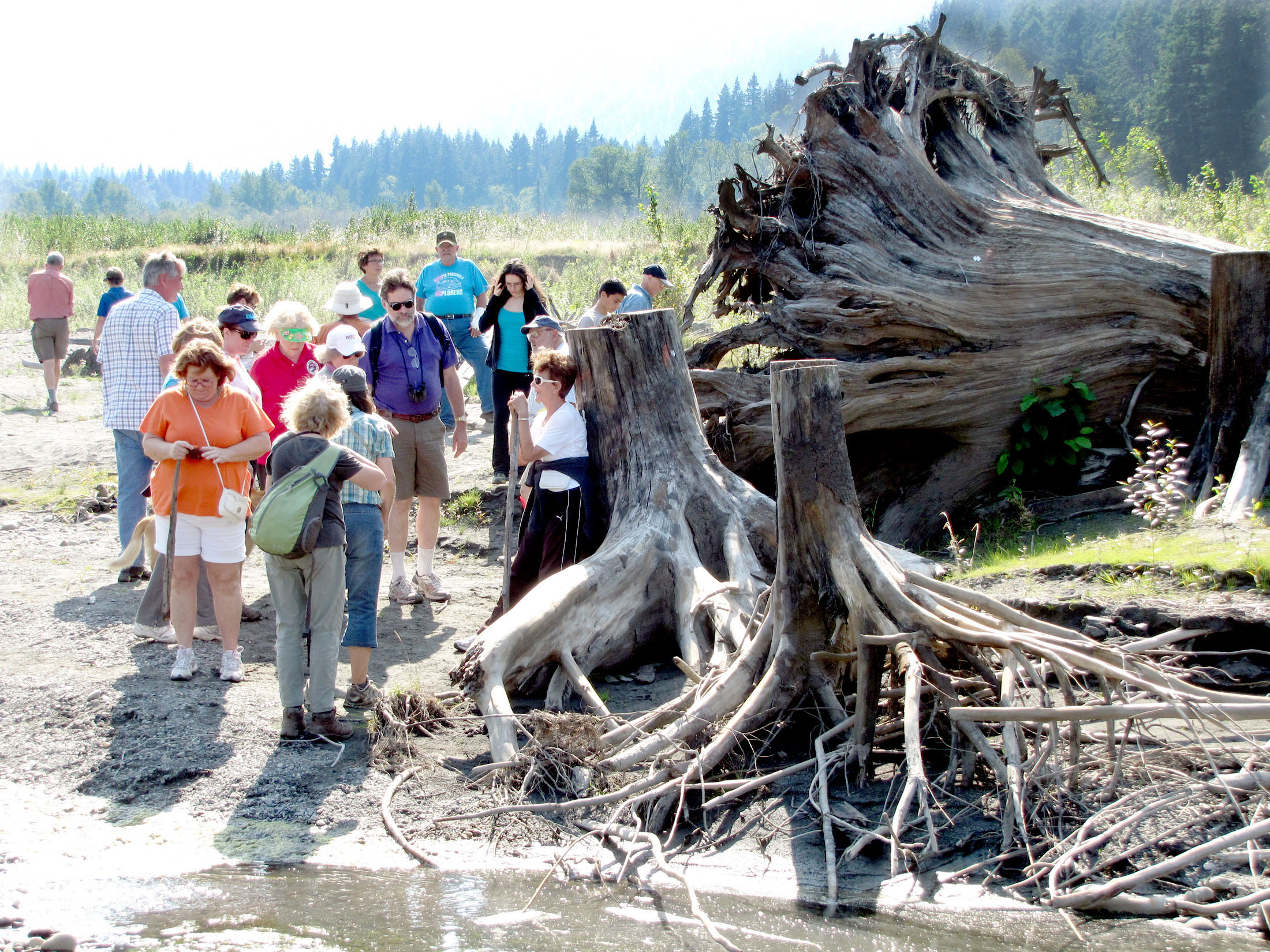PORT ANGELES — The now-dry bed of Lake Aldwell — no longer a bare moonscape as trees, grasses and other native plants sewn by both nature and man take hold — is waiting to be explored today.
More than 100 hikers took part Sunday in two morning and afternoon hikes guided by Olympic National Park rangers to explore the geology, archaeology and the newly sprouted flora in areas once 40 feet under the surface of Lake Aldwell.
The program offers two more free, 2-hour walks at 10 a.m. and 2 p.m. today at the former boat ramp at the end of Lake Aldwell Road, just off U.S. Highway 101.
“People are coming here just for the walk. They come from Seattle and British Columbia, and beyond,” Park Ranger Denison Rauw said Sunday.
Participants Sunday walked among 12-foot poplar saplings, remnants of the valley’s history as a recreational lake and massive tree stumps hidden from view for more than a century.
[To see real-time views of the former Elwha River dam sites and the bottoms of former lakes Aldwell and Mills, click on the Elwha Dam webcam link above “Top of the News” on the homepage.]
Additional hikes will be held at the same times Sunday, Aug. 31 and Tuesday, Sept. 2.
Visitors should wear sturdy walking shoes or boots, bring water and be prepared for windy conditions and no shade.
Participants are free to continue exploring the lakebed area after the tours.
In 2011, the lake was drained as the Elwha Dam was removed as part of the $325 million Elwha River restoration project.
The work includes the removal of the Glines Canyon Dam, which is expected to be completed soon upriver.
So many people arrived at the hike’s starting point Sunday that organizers divided them into two groups, each led by a park ranger on slightly different routes through the newly sprouted forests.
Rauw, one of the two guides Sunday, led a group of about 65 people of all ages into the lake bed.
The path was challenging in that the a mix of sand, gravel and cobbles was soft and shifted underfoot as hikers climbed from washes up to ledges cut by the river’s path through a century of built-up sediment.
Bare rocks baked the air above in areas where plant life was just starting to take hold, while the growing glades of saplings cooled other parts of the river bottom.
“Here we would be 40 feet under the surface of the water,” Rauw said at one point in the hike while standing amid both living and dead Douglas fir sprouts recently planted by the park service.
At one point, a bald eagle flew overhead, and Rauw pointed out a nearby eagle nest in a snag on the hillside overlooking the river and a young glade of willow trees.
“There is so much to this place. It is incredible,” said hiker Mike Hamilton, of Abbotsford, B.C., who said he has been staying in Port Townsend and had wanted to visit the Elwha River for some time.
Rauw also led the hikers through a maze of 12-foot tall poplar trees to the remnants of a row boat reported lost in the lake in 1972.
The remains of the boat have been vandalized since it was found, and other artifacts from the construction of the lake and its 100 years of use as a reservoir have been removed by people exploring the lake bed.
A 100-year-old wagon wheel taken from the area was later recovered by the park, she said.
The land is currently managed by Olympic National Park but is not part of the national park, Rauw said.
It has not yet been determined who will own the land when the restoration project is over, she said.
Agencies that have expressed interest in the land include the Lower Elwha Klallam tribe and the state Department Fish and Wildlife, she said.
During the years of dam operations, the land was privately owned by a succession of energy companies and mill owners.
The lake bed, about 8 miles west of Port Angeles, is open year-round and has become a favorite hiking area for many area residents.
Trails through the lake bed can be accessed from the former boat ramp or from the dam site parking lot at Lower Dam Road, just off state Highway 112 at the north end of the lake.
Dogs on leashes are permitted. No park admission pass is needed.
For more information about the walks, phone the Olympic National Park Visitor Center in Port Angeles at 360-565-3130.
To learn more about the Elwha River restoration, the world’s largest dam-removal project, visit the Olympic National Park website at http://tinyurl.com/PDN-Elwha.
________
Reporter Arwyn Rice can be reached at 360-452-2345, ext. 5070, or at arwyn.rice@peninsuladailynews.com.

